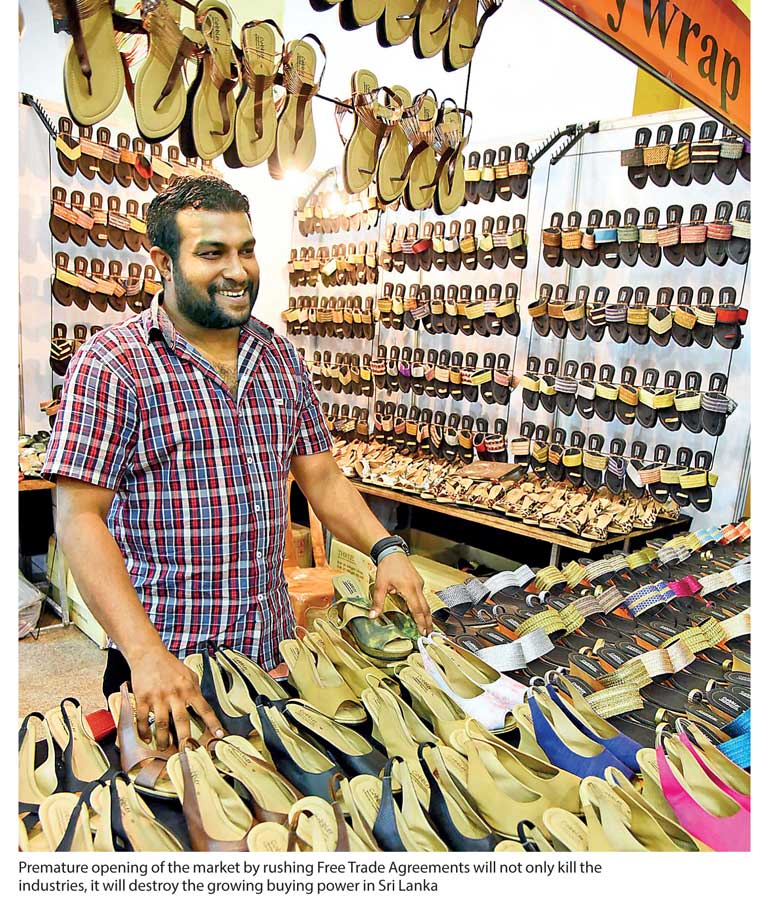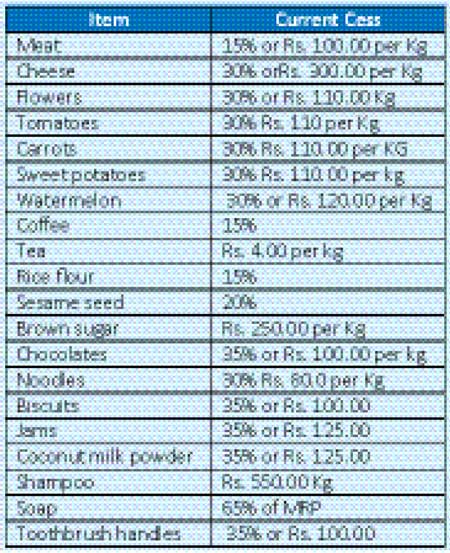Sunday Feb 22, 2026
Sunday Feb 22, 2026
Wednesday, 15 March 2017 00:00 - - {{hitsCtrl.values.hits}}
 We Sri Lankan industrialists keep on demanding consistency in industrial policies. Every Government has kept on proposing completely new policies that were not highlighted even in their manifestoes. The latest magic word used by the current Government is ‘Free Trade Agreements’.
We Sri Lankan industrialists keep on demanding consistency in industrial policies. Every Government has kept on proposing completely new policies that were not highlighted even in their manifestoes. The latest magic word used by the current Government is ‘Free Trade Agreements’.
The success of any Free Trade Agreement will mainly defend on the availability of a range of products which can be marketable to the other partner where his specialty is different to the partner. If the Free Trade Agreement is one-sided, the loser will be the country that has a lesser number of products or services that can be offered.
When a senior minister visits any country the visit follows up with a proposal to negotiate a Free Trade Agreement. The latest worry hovering over our heads at the moment is the China-Sri Lanka Free Trade Agreement (CSLFTA). The biggest ‘breaking news’ we received was from the Prime Minister’s Office and it has originated from the Cabinet Committee on Economic Management dated 16 January. This letter is with a sub heading ‘Tariff Reduction Modality under China-Sri Lanka Free Trade Agreement (CSLFTA) and removal of Cess’.
Before expressing our view point on the above, I wish to quote from the Export Development Board web site itself as it carries very valuable intention to help local farmers and industrialists. I wish to highlight since 1979 how the Cess was effectively used by so many governments for the betterment of the industry.
Cess came into effect from Sri Lanka Export Development Act No. 40 of 1979. We local industrialists felt at the beginning with the Cess implementation that it was a blessing for us. As per EDB explanation on ‘what is CESS?’ it clearly indicates Cess as a local levy on commodity/product for special purpose and it describes very clearly the objectives.
Under rates, it is indicated 1% to 35%.
Computation of Cess Levy: (CIF value + 10% of CIF value x Rate of Cess levy) – Source: Export Development Board.
The objective of the Cess is very clear. It shows the commitment of political and other Government officials to convert Sri Lanka into an industrial nation while maintaining the status quo. Old visionaries clearly understood the importance of local farmers, especially when you consider food security as well as manufacturers required a certain amount of nurturing and care by having protection to take them to the next level.
Unfortunately the funds collected were taken away from the EDB most probably for better “safe keeping “in consolidated fund. So out of the three important objectives one was taken away by the then Government as they thought they are the best specialist who knew how to spend money wisely! The Cess funds were supposed to be ploughed back into the industry to provide more assistance to improve productivity and efficiency in the particular industry; the Cess funds were used at the inception as per the anticipation of the creators though it got diluted at the latter stage.
The latest development came from cabinet committee on economic management. It has taken a 360-degree turn with reference to Cess which is used strategically up to now by EDB for successfully ensured industries like biscuits, footwear, cosmetics, shampoo, soap, furniture, tea, cordials, milk products and jams to reach recognisable growth level. Furthermore, certain industries have become foreign exchange earners as well as savers. In addition all these industries built up the necessary resilience to survive the longstanding civil war and terrorism without massive retrenchments.
Cess which is used strategically up to now by EDB for successfully ensured industries like biscuits, footwear, cosmetics, shampoo, soap, furniture, tea, cordials, milk products and jams to reach recognisable growth level. Furthermore, certain industries have become foreign exchange earners as well as savers. In addition all these industries built up the necessary resilience to survive the longstanding civil war and terrorism without massive retrenchments.
When we study the present status of Cess imposed on imports we feel it was done with a very high level of responsibility to safeguard the economy of an island with a 21 million population.
Out of 1 to 99 HS classification chapters, we can find 1,742 items under Cess. The figure explains how the Cess mechanism is used to develop the local industry and farming. This figure explains up to now how Cess is being used to generate new employment. The few examples given in the table show how the Cess mechanism is used to safeguard farmers and local producers. We cannot forget that the Government has earned a substantial income through the Cess from Cess implementation. (As the list will be too big the information in the table is limited up to Chapter 35 only.)
As per the Cabinet Committee of Economic management letter dated 16 January, “No. 2 agrees to phasing out and removal of Cess over a period of five years commencing from the fifth year of the CSLFTA coming into force.”
We cannot identify the rationale behind dumping a successful scheme in a hurry without any detailed study. If it only for the sake of successful signing of CSLFTA, we can predict it will be not a very wise option.
A person without any industry experience or any layman will understand what will happen to most industries in Sri Lanka if this drastic deviation from present policies is implemented in a hurry without evaluating the consequences. In addition if it is implemented in the said manner I do not think the authorities have already decided which industries will be targeted in the first year and so on to remove the Cess. Having so many uncertainties in the mind of industrialists will not bring in any new investment. I do not think any ministry or Government authority has done a survey on sunset industries or sick industries. The half-baked action that is already scheduled for implementation will definitely lead to a sudden death for so many industries. It can even have negative effects physically among industrialists as they are not sure which way to go!
Anyone can argue asking why industrialists are scared of opening the market, especially to China. Yes, it is a valid question. When you compare the basic requirements for a successful industry and when you make a comparison with China we are miles apart. A few major factors are highlighted below:
Chinese operators live in dormitories and they do not have to undergo any hassle to report to work – transport is not required. In Sri Lanka an operator has to leave home more than one hour before commencement of work. When they reach the production unit they have lost the enthusiasm to work and energy and fatigue has already set in. Poor night time travelling facility specially targeting night shift working personnel is another killer.
In China, factory premises are Government owned and built and handed over to operate to private partners. In Sri Lanka all the factories are privately owned.
In China, uninterrupted power is available at a very competitive rate. Sri Lanka has one of the highest rates in Asia and still we are dreaming of uninterrupted power supply.
Chinese labour is from distant places and they enjoy long vacations only. They do not enjoy frequent holidays; the onetime delivery has become a general rule.
In Sri Lanka we work only 243 days in a year, e.g. 2017. From this when you reduce 21 days entitled leave, it comes down to 222 working days.
China has become the factory to the whole world. They enjoy the advantage of scale of production. China has a wide range of products compared to Sri Lanka. In these circumstances if the Government proceeds with the proposal of reducing Sri Lankan Negative List, this will result in the a total collapse of industries in Sri Lanka (point number one in the letter issued by the Cabinet Committee of Economic Management to reduce the Sri Lankan Negative List).
 Best approach
Best approach
As private sector industrialists, we feel the best approach the Government should adopt is to implement a policy that will ensure the growth of private sector industries that have currently displayed the capability of going global and which have displayed potential for growth, especially the industries that have at least served a reasonable share of the Sri Lankan market to be nurtured through the Export Development Board.
Premature opening of the market by rushing Free Trade Agreements will not only kill the industries, it will destroy the growing buying power in Sri Lanka. It is only by having industrial production economy that we can anticipate a rapid growth in Buying Power Index. We must never consider that Free Trade Agreements will ensure growth in trading as the answer for all our worries. This will lead to a rise in unemployment and retrenchment, in addition we will be burdened with a very big decrease in buying power and poor distribution of wealth in the country.
I finally wish to state that the Government must publically demonstrate and inform the masses about the advantages we as a country are going to gain from so-called Free Trade Agreements with proper statistics.
(The writer is Past Chairman of the Ceylon National Chamber of Industries. He can be reached via email [email protected] or mobile 0777815296.)